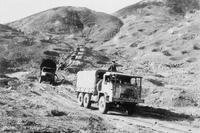The U.S. is open to setting up more stand-alone artillery firebases in Iraq similar to the one in which a Marine was killed last month to support an advance by Iraqi Security Forces towards Mosul, a top Pentagon planner said.
"As the ISF progresses toward isolating Mosul, there may be a situation where there is another base that is opened -- or re-opened from years past -- that would be used in the same manner as a fire support base," Rear Adm. Andrew L. "Woody" Lewis told reporters on Wednesday.
However, the move is "dependent on what's happening on ground and what's happening in the campaign," said Lewis, the Joint Staff's vice director for operations at the Pentagon.
Lewis said no additional firebases have been set up as yet since about 200 Marines from the 26th Marine Expeditionary Unit secretly deployed last month with four 155mm howitzers to establish a front-line position about 60 miles southeast of Mosul.
The position that the Marines called Fire Base Bell -- the Iraqis call it the Kara Soar Counter Fire Complex -- was set apart from the Iraqi forces and was the first stand-alone fire base for U.S. troops in Iraq.
On March 19, rocket fire from the Islamic State of Iraq and Syria, or ISIS, killed Staff Sgt. Louis Cardin, 27, of Temecula, California, and wounded eight other Marines. On April 1, hundreds gathered on the steps of the Temecula city hall to honor Cardin, a 10-year Marine veteran.
The presence of the Marines near Makhmour, projected as a staging base for an advance on Mosul by Iraq's 15th Division in concert with Kurdish Peshmerga fighters, only became known after Cardin's death.
Cardin was the second U.S. service member officially listed as having died in combat on the ground in Iraq since the air campaign to degrade and defeat ISIS began on Aug. 8, 2014. The first U.S. combat casualty occurred last October during a special operations raid on the northern town of Hawijah to free ISIS prisoners in which Army Master Sgt. Joshua L. Wheeler, 39, of Roland, Oklahoma, was killed.
At a Pentagon news conference, said that the Marine fire base was part of the "accelerated" campaign against ISIS that was focused on retaking Mosul, the main ISIS stronghold in Iraq, and Raqqa, the self-proclaimed ISIS capital in northeastern Syria.
Last month, Defense Secretary Ashton Carter and Joint Chiefs Chairman Marine Gen. Joseph Dunford said they would be sending requests to President Barack Obama to authorize sending additional U.S. troops to the region to support the accelerated campaign.
Obama has consistently ruled out ground combat for U.S. troops in a strategy relying on coalition and U.S. airstrikes and "train, advise and assist" missions in support of local Iraqi and Syrian opposition ground forces.
Lewis declined to say how many U.S. troops are currently in Iraq beyond the authorized limit of 3,870. The U.S. has acknowledged routinely exceeding the limit because of overlaps in troop rotations and the presence of troops on temporary assignments. Last month, Dunford said there "fewer than 5,000" U.S. troops in Iraq.
Lewis spoke a day after Obama convened a White House meeting of Carter, Dunford, the service chiefs and the regional combatant commanders that primarily dealt with efforts to retake Mosul and Raqqa. Carter has said previously that Obama has frequently pressed him to oust ISIS from the two strongholds before he leaves office.
"One of my main messages today is that destroying ISIL continues to be my top priority," Obama said in prefatory remarks to the meeting, using another acronym for ISIS. "And so we should no longer tolerate the kinds of positioning that is enabled by them having headquarters in Raqqa and Mosul. We've got to keep on putting the pressure on them."
In a letter Tuesday to Carter, Sen. John McCain, an Arizona Republican and chairman of the Senate Armed Services Committee, raised concerns about what he called the "grudging incrementalism" indicated by the request from Carter and Dunford for more troops.
"As a young military officer, I bore witness to the failed policy of gradual escalation that ultimately led to our nation's defeat in the Vietnam War," said McCain, a Navy pilot in Vietnam who was shot down and spent nearly five years as a prisoner of war.
"I fear this administration's grudging incrementalism in the war against the Islamic State (ISIL) risks another slow, grinding failure for our nation," McCain said.
Last year, McCain and Sen. Lindsey Graham, a South Carolina Republican, called for the deployment of 20,000 U.S. troops -- 10,000 for Iraq and 10,000 for Syria -- as trainers and advisers to speed up the campaign against ISIS.
McCain and Graham said the additional U.S. troops would act in support of a proposed ground force of troops from Sunni Arab countries such as Egypt, Turkey and Saudi Arabia.
-- Richard Sisk can be reached at Richard.Sisk@Military.com.




























